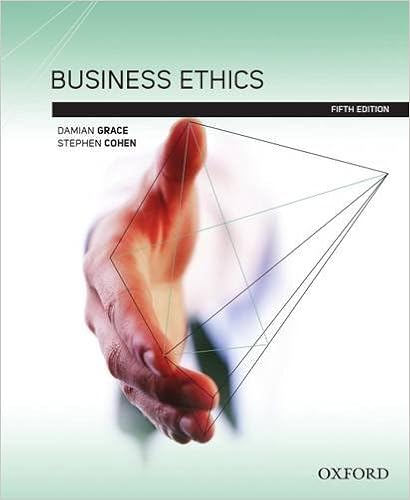
Written within the eu culture of Kant's philosophical trilogy on critique and Hegel's idea of moral lifestyles it outlines the good traditions in moral philosophy: Aristotelian advantage ethics, Kantian ethics, and utilitarianism. It offers glossy ethics from Nietzsche, Adorno, and Habermas to Kohlberg's phases of ethical improvement.
Read or Download Critical Management Ethics PDF
Similar Business Ethics books
Geoethics: Ethical Challenges and Case Studies in Earth Sciences
Edited by means of specialists within the sector, Geoethics: moral demanding situations and Case reports in Earth Sciences addresses quite a number issues surrounding the concept that of ethics in geoscience, making it an immense reference for any Earth scientist with a turning out to be quandary for sustainable improvement and social accountability.
Company Ethics examines the ethics of commercial via concerns concerning universal company events. The 5th variation discusses theories of ethics attached with company and explores the complexities of commercial sustainability-the problems of working profitably whereas upholding society's expanding calls for for moral and social accountability.
The False Prison: A Study of the Development of Wittgenstein's Philosophy Volume 1
This can be the 1st of 2 volumes which describe the improvement of Wittgenstein's philosophy from the Tracatus to his later writings. half I of this quantity is a survey of the entire of his paintings; half II is a close exam of the vital principles for his early process. the second one quantity will disguise later philosophy.
Between Enterprise and Ethics: Business and Management in a Bimoral Society
We are living in a 'bimoral' society, within which humans govern their lives through contrasting units of rules. at the one hand there are the rules linked to conventional morality. even supposing those enable a modicum of self-interest, their emphasis is on our tasks and responsibilities to others: to regard humans truthfully and with recognize, to regard them quite and with out prejudice, to aid and are for them while wanted, and finally, to place their wishes above their very own.
Additional resources for Critical Management Ethics
For that reason, cash and market-driven constructions of the genuine life flip taxi-drivers into capacity instead of ends. This renders the belief of monetary self-determination a neo-liberal phantasm (Offe and Wiesenthal 1980). for that reason to be a taxi-driver or an worker is usually made up our minds by way of monetary necessity, now not self-determination. accordingly, the textbook analogy of taxi-driving equals employment less than administration is as fake because the assumption that either characterize Kant’s self-determination. five. fake universalism – the 5th challenge by utilizing the taxi-driver instance, managerial textbook writers wrongly equalise the person of a taxi provider with administration. however the person of a taxi doesn't develop into the driver’s supervisor that is the underlying fake assumption offered within the case to aid administration. utilizing a taxi constitutes a person act whereas administration represents a constitution of energy family that reaches some distance past that. this example for this reason is a sort of fake universalism. considering that extra everyone is hired operating within managerial regimes than using taxis one wonders why a great case – taxi-driving – is used to make a generalisation on administration. Managers tackle the explicit kind of organisational behaviour represented within the enterprise guy. they usually convert people into human assets inside of parameters set by means of administration. None of those features is exhibited via the standard taxi-driver nor are they depicted through the consumer of a taxi. Human behaviour (taxi-ride) and organisational behaviour (management) can't be equalised. 6. Hypothetical central – the 6th challenge one other challenge of the taxi-driver case rests at the incorrect conversion of Kant’s express significant right into a hypothetical relevant. Kant distinguishes among either. For him ethics exists within the realm of the explicit valuable. as a result, others need to be handled as ends in-themselves. There can't be any stipulations connected to express imperatives. they're ‘musts’ and never ‘if-and-then’ structures. there is not any different choice than to behave morally. notwithstanding, Boatright (2009:66) writes … we must always appreciate people … in keeping with Kant’s specific important notwithstanding we needs to, no longer should still, admire people. Kant’s express primary leaves no alternative except to persist with ethics. In sharp distinction to Kantian ethics, administration and its affirmative writers need to flip Kant’s express significant right into a hypothetical one that allows you to make it sound believable that Kantian ethics helps administration. 7. TINA – the 7th challenge The invented taxi-driver instance negates that there are different – non-market pushed – varieties of getting from A to B. It offers the case as TINA: there's no substitute. yet there's. In Kant’s country of Ends someone that seeks to move from A to B can achieve this as an finish in-itself. unlike administration who converts people into buyers and providers of a provider, an individual can circulation from A to B with no changing into a way within the type of a buyer.



